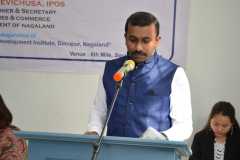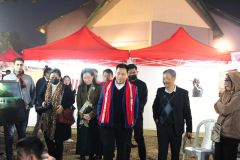Panel discussion on “Developing sustainable tourism in Nagaland” | 19 Jan. 2024 | 2nd Nagaland International Trade Expo (NITEX) 2024
By Henlly Phom Odyuo | Eastern Mirror
DIMAPUR — There is a call for Nagaland tourism, which is overstressed during the annual Hornbill Festival, to attract tourists to the state throughout the year but not at the cost of depletion of natural resources.
This was deliberated during a panel discussion on ‘Developing sustainable tourism in Nagaland’ at the ongoing second Nagaland International Trade Expo (NETex), organised by the Business Association of Nagas (BAN) at Senden Riju, on Friday.
The expert panelists included Nagaland Association of Tour Operators (NATO) general secretary Veluzo Tetseo; Assistant High Commissioner of Bangladesh in Guwahati, Ruhul Amin; Wildlife Warden, Dimapur, Tokaho Kinimi; Bobby Singh (Zone by The Park Niathu); 4X4 attitude co-founder Yanren Jami; and Additional Director, Department of Tourism, Veyeilo Duolo.
The assistant high commissioner of Bangladesh said that tourism has to be conducted in a sustainable way though plays an important role in the economy.
“Our goal is not only to develop but develop in a sustainable way,” Amin said, adding: “Tourism contributes to 8% of global greenhouse gas emission which is a big number. If we think about tourism we should not only think about the livelihood of the people but also conserve natural heritage and cultural heritage. At the same time we have to look into fulfillment of tourists and in this the stakeholders have to look in to conservation of environment.”
He went on to say that environmental concern should not be undermined in tourism sector.
Veluzo Tetseo said that tourism has not grown in size but is refining into a masterpiece in Nagaland. Besides this, he said, there are some other traits including “our history, wildlife and landscape, rich heritage and culture,” that are attracting tourists to the state.
While pointing out that social media has changed the perception about Nagaland as an unsafe state due to insurgency, he lamented disappearance of Naga’s rich heritage at a quick pace.
Yanren Jami, who is into adventure tourism, pointed out that the sector is overstressed in the state during the Hornbill Festival, while remaining inactive in other months of the year.
He said encouraging adventure tourism will not only give the much-needed impetus in this tourism sector but also attract tourists throughout the year as adventure tourism gives them an opportunity to visit small pockets in the state and boost tourism at the local level.
Adventure tourism, Jami said, is not just male-dominated or confined to younger age group but involves all age groups, irrespective of gender. It is also a “cultural immersion,” he added.
Additional Director of Tourism Duolo said that for sustainable tourism, the community has to be taken into confidence.
“As a department we take the community into confidence before implementing anything. During the last Hornbill Festival, the Nagaland tourism followers increased but the department did not go for wide publicity because of the insufficient capacity for accommodation” he said.
Admitting that 20-30 years ago, tourism projects in the state were implemented haphazardly without taking into account the feasibility, Duolo disclosed that in the last 10 years, the department has been doing projects according to “the need.”
Kinimi underscored the need for the state to focus on value-added tourism and not mass tourism, so as to give quality experience to all tourists coming to Nagaland.
“We need expertise in various field of environment who can give the tourists a real time and learning experience,” he opined, while pointing out that when it comes to Nagaland, the national park in the state, when compared to the state’s land ratio, is very meager.
Maximum of the land is owned by the community or private individuals, so tourism has to be developed in these areas, he added.
Kinimi also disclosed that there are 137 community reserves notified by the state government, out of which 72 have ongoing projects at par with wildlife sanctuaries, solely managed and run by village communities.
“This will have high potential for eco-tourism and eco-tourism should be in such a manner that it does not cause damage to those areas where we are carrying out the activities,” he said.
Nagaland, he asserted has a fragile eco-system and “so we have to be careful in our approach as well. Whatever models that we prepare should be eco-friendly and these activities should benefit directly to the village communities”.




